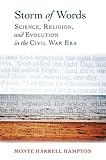Storm of Words : Science, Religion, and Evolution in the Civil War Era.
Material type: TextSeries: Religion and American CulturePublication details: Tuscaloosa : University of Alabama Press, 2014.Description: 1 online resource (358 pages)Content type:
TextSeries: Religion and American CulturePublication details: Tuscaloosa : University of Alabama Press, 2014.Description: 1 online resource (358 pages)Content type: - 9780817387624
- 0817387625
- 9780817318314
- 0817318313
- Presbyterian Church -- Southern States -- History -- 19th century
- United States -- History -- Civil War, 1861-1865
- Christianity and culture -- United States
- Religion and science
- Religion and Science
- Église presbytérienne -- États-Unis (Sud) -- Histoire -- 19e siècle
- États-Unis -- Histoire -- 1861-1865 (Guerre de Sécession)
- Religion et sciences
- RELIGION -- Christianity -- Presbyterian
- Christianity and culture
- Presbyterian Church
- Religion and science
- Southern States
- United States
- American Civil War (United States : 1861-1865)
- 1800-1899
- 285/.17509034 23
- BX8962 .H36 2014
- online - EBSCO
| Item type | Current library | Call number | URL | Status | Notes | Barcode | |
|---|---|---|---|---|---|---|---|
 eBook
eBook
|
Biblioteca "Angelicum" Pont. Univ. S.Tommaso d'Aquino Nuvola online | online - EBSCO (Browse shelf(Opens below)) | Online access | Not for loan (Accesso limitato) | Accesso per gli utenti autorizzati / Access for authorized users | (ebsco)799543 |
Print version record.
Acknowledgments; Introduction; 1. "The Presbyterian and Orthodox Idiosyncrasy of Mind"; 2. Navigating by the "Pole-Star": The Engagement with Modernity; 3. A "New and Frisky Science": Race, Religion, and the Response to Anthropology; 4. The Fidelity of a "Handmaid": Genesis and Geology in the Presbyterian South; 5. "A Revolution in Our Church": Founding and Filling the Perkins Professorship; 6. "The Serpent-Trail of Rationalism"; 7. "A Crown Pure and Bright": The Southern Presbyterian Evolution Controversy; Conclusion; Notes; Bibliography; Index.
Storm of Words is a study of the ways that southern Presbyterians in the wake of the Civil War contended with a host of cultural and theological questions, chief among them developments in natural history and evolution. Southern Presbyterian theologians enjoyed a prominent position in antebellum southern culture. Respected for both their erudition and elite constituency, these theologians identified the southern society as representing a divine, Biblically ordained order. Beginning in the 1840s, however, this facile identification became more difficult to maintain, colliding.
Includes bibliographical references and index.
English.


